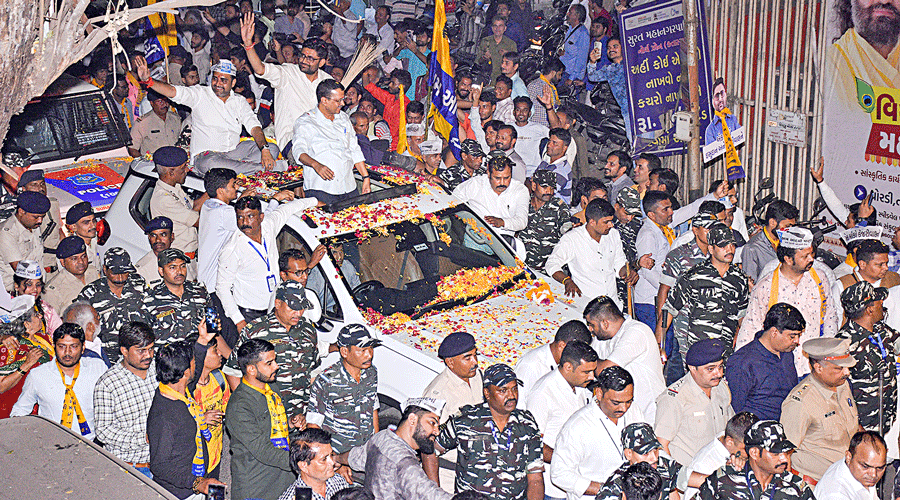Prime Minister Narendra Modi held a 25km roadshow in Surat earlier this week and stayed the night, but tea seller Ashvinbhai couldn’t care less.
“Jhadu chalana padega yahan. BJP walon ne bahut gandagi faila diya hai (The broom needs to be wielded here. The BJP fellows have piled too much filth),” he said angrily.
The reference to the “broom”, the election symbol of Arvind Kejriwal’s Aam Aadmi Party, was not accidental. It was an indication of how the new entrant to Modi’s Gujarat has succeeded in spurring the voters to speak out against the BJP’s 25-year rule, at least in some pockets.
While this may not be enough to dislodge the BJP, it seems to have got the ruling party feeling threatened in its citadel of Surat — as evident from Modi’s roadshow and night halt in the textile and diamond city. Party sources said Modi was not known to conduct such long roadshows. The Prime Minister leaned out of his car and waved at the crowd. A longer roadshow unfolded in Ahmedabad later.
Modi also held a meeting with diamond and textile traders in Surat, which voted on December 1. Many of the traders are said to be secretly backing the AAP to cut the BJP down to size and get it to respond to their problems. Sources said Modi listened to the traders’ grievances and promised solutions.
Modi also had to contend with an unexpected development during the roadshow. Near Yogi Chowk, a group chanted “Kejriwal, Kejriwal” as the Prime Minister’s cavalcade passed.
The AAP circulated a video clip of the incident on its social media platforms — a small strike-back for the regular “Modi, Modi” chants that have bedevilled Kejriwal’s roadshows across Gujarat.
Ashvinbhai’s tea shop is barely a kilometre from the place where the Kejriwal slogans were hurled at Modi. “We have no complaint against Modiji. It’s the local system here, controlled by the BJP, that we want to change,” he said, stressing the need for a “mazboot bipaksh (strong Opposition)”.
“Everything was fine as long as Modiji was in Gujarat (as chief minister). After he went to Delhi, there has been no control on the BJP walas here,” said Ashok Dhanani, who runs a sweets-and-snacks shop. He alleged that municipality workers demanded bribes to collect the garbage outside his shop and that he had been receiving surprisingly high electricity bills.
Shopkeepers, traders and workers in this city have complaints relating to civic affairs, taxes, expensive private education, high electricity bills and the like and are looking up to the AAP to shake up the BJP and make it accountable.
To Kejriwal, these hopes are a chance not just to spread his party’s influence outside Delhi and Punjab but also to project it as a national player that can replace the Congress as a “credible challenger” to the BJP by cornering Modi on his home turf.
The popular perception in Surat, however, is that though the jhaadu may have caused quite a stir, it cannot hope to win more than two or three of the 12 seats in this southern Gujarat city. BJP leaders too privately acknowledge that the AAP is putting up a tough fight in at least two seats — Varaccha Road and Katargam.
AAP spokesperson Yogesh Jadavani, however, claimed his party would win six of the 12 seats. “Just wait till the results,” he said.
Kejriwal has campaigned extensively in Surat, trying to convince the voters he can pull off the impossible.
“In Delhi, too, they used to say there was no space for a third party. When the results came in, the Congress had zero seats and the BJP just 3 out of 70,” he said, referring to the 2015 Delhi Assembly polls. “There is a wave for change across Gujarat and the AAP is coming to power.”
To win the people’s trust, the AAP has been distributing plastic “guarantee” cards with pictures of Kejriwal waving the Tricolour, promising a long list of “freebies” such as free electricity, pensions and an unemployment allowance.
The AAP had caused the first splash in this BJP bastion last year when it won 27 councillors’ seats in the Surat municipal elections, most of them from Varachha Road and Katargam.
These areas, known for the diamond cutting and polishing industry, are dominated by Patidars from Saurashtra. The community is believed to be providing heft to the AAP after Hardik Patel’s agitation for reservations fizzled out. Hardik has joined the BJP. The AAP’s candidates from the two seats — Alpesh Katharia and Gopal Italia — had led the 2016 Patidar agitation along with Hardik.
“Even if the AAP wins a couple of seats in Surat, the BJP will receive a jolt and begin working honestly. The BJP thinks it’s invincible in Surat,” said Jayasbhai, who had come to Kejriwal’s election meeting, held after a roadshow on Monday.
Kejriwal’s staunchest supporters are hoping that his party would win at least one seat in each of the state’s 33 districts and replace the Congress as the principal Opposition.










